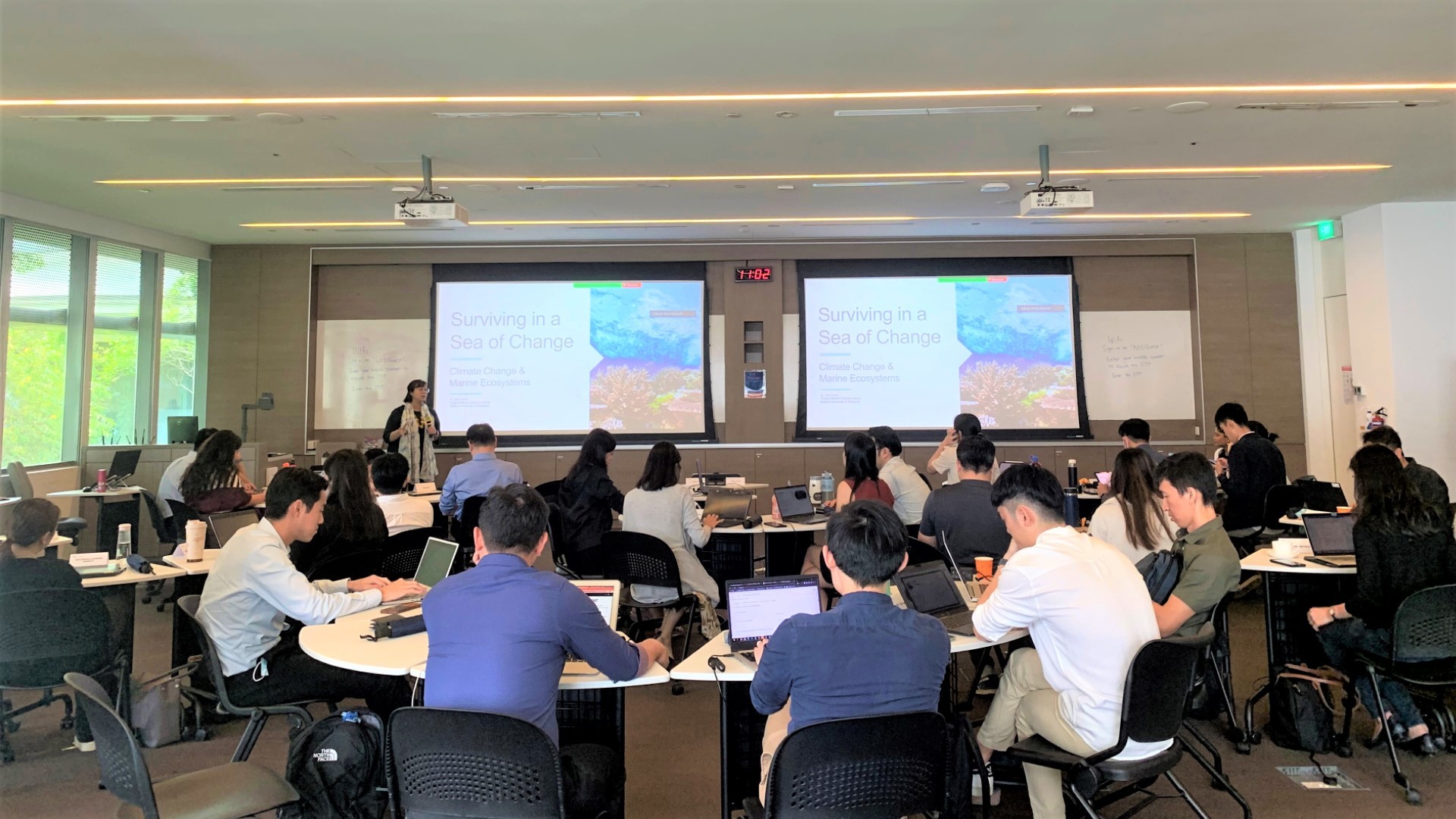Inaugural NUS sustainability course paves way for greater training of green talent in public sector
‘Sustainability 101 for Policy Officers’ is the first executive training programme in Singapore to cover all aspects of sustainability

The inaugural run of a sustainability-focused training programme for public sector officers, developed and delivered by NUS, concluded on 2 December 2022, paving the way for more courses to upskill the public sector in this pertinent area as Singapore develops its green economy.
Organised by the NUS Centre for Nature-based Climate Solutions (CNCS), a research centre of NUS’ Faculty of Science, and supported by the NUS School of Continuing and Lifelong Education (NUS SCALE), Sustainability 101 for Policy Officers is the first course targeted at public sector officers in Singapore to cover a broad range of sustainability issues, from international climate negotiations to domestic environmental policies and regulations. Some 34 government policy officers from 19 different government agencies, including the Monetary Authority of Singapore (MAS), national water agency PUB, and the Ministry of Foreign Affairs (MFA), attended the first run of the course.
Two more runs are being planned for 2023, under a Memorandum of Understanding (MOU) signed between NUS and the National Climate Change Secretariat (NCCS), a unit under the Prime Minister’s Office Strategy Group. Under the MOU, NUS will also develop additional programmes for the public sector aimed at highlighting the opportunities and challenges of taking climate action, as well as how international sustainability trends relate to Singapore. Through such courses, policy officers will be equipped with the latest science and knowledge of climate change, nature-based solutions, carbon markets, and sustainability concepts, allowing them to better incorporate sustainability considerations into policymaking.
Professor Koh Lian Pin, Director of CNCS, said, "With the inception of the Singapore Green Plan 2030 and our net-zero by 2050 target, evidence-based and science-backed policymaking will be essential to direct Singapore to meet critical climate objectives and move the country forward.”
“I am glad that our inaugural Sustainability 101 programme has brought together government, non-profit, academic, and corporate stakeholder groups in fruitful discussions to train government officers to think sustainably in their policymaking,” he added.
Mr Heng Jian Wei, Director of Policy and Planning at NCCS, said, "2022 has been a significant year for Singapore’s Sustainability journey – we raised our climate ambition to reach net zero by 2050 and will be pursuing a range of sustainability initiatives and plans, from mitigation to adaptation to green economy.”
“The Sustainability 101 programme for public officers will help build up foundational skills and knowledge across multiple agencies to support Singapore’s efforts to combat climate change,” he affirmed.
Building a talent pipeline for Singapore’s emerging green economy
The first run of Sustainability 101 for Policy Officers was organised in two parts. The first half was held between 31 October and 2 November, and exposed participants to topics such as climate change science, governance, and economics. The second half ran from 1 to 2 December, after the United Nations climate change conference COP27 had concluded. Participants discussed the key outcomes of COP27, Singapore’s energy transition, and the importance of research and partnerships between the public, private, people, and academic sectors. The five-day programme featured talks and presentations by NUS lecturers, industry leaders and sustainability advocates.
Developing talent in the green economy is crucial to Singapore’s plans to grow its green economy, as outlined in the Singapore Green Plan 2030. The country’s target of bringing its planet-warming emissions down to net zero by the year 2050 is also a nation-wide effort that requires policymakers across the public sector to have a stronger grasp of climate science and policy.
Professor Susanna Leong, NUS Vice Provost for Masters' Programmes and Lifelong Education and Dean of NUS SCALE, said, "NUS leverages our intellectual resources across a wide range of academic disciplines and research entities, such as CNCS, to offer cutting-edge continuing education programmes that help our learners appreciate the complexities of environmental issues, and devise innovative solutions to address the multifaceted global challenge of climate change.”
Ms Shaw Qi Xuan, an executive with the Public Sector Sustainability Office at the Ministry of Sustainability and the Environment and an alumna from NUS’ Faculty of Arts and Social Sciences (Class of 2022), was one of the policy officers who participated in the inaugural run of the Sustainability 101 for Policy Officers programme. She shared: “The course has equipped me with fresh perspectives on sustainability, thanks to the various speakers and academics who took the time to expose us to pertinent concepts and issues. It was also heartening to learn and be connected with policy officers hailing from different parts of the public sector, all of whom share my belief that sustainability is a pressing issue of our time.”
“As the sustainability space continues to evolve, I would encourage my policy colleagues from other government agencies to attend future iterations of this programme, so as to be kept abreast of new trends and issues that emerge which could be relevant to their work in policymaking,” she added.
By NUS CNCS



